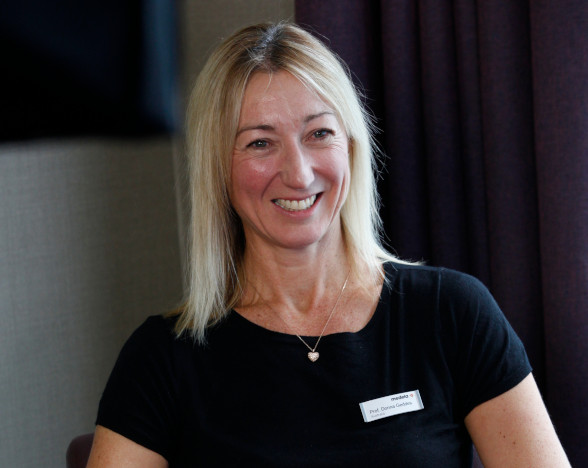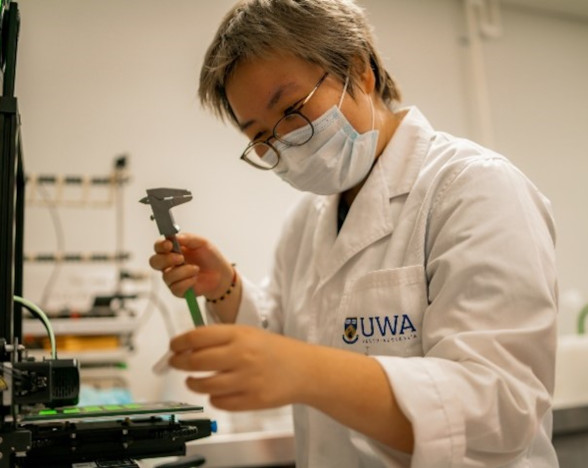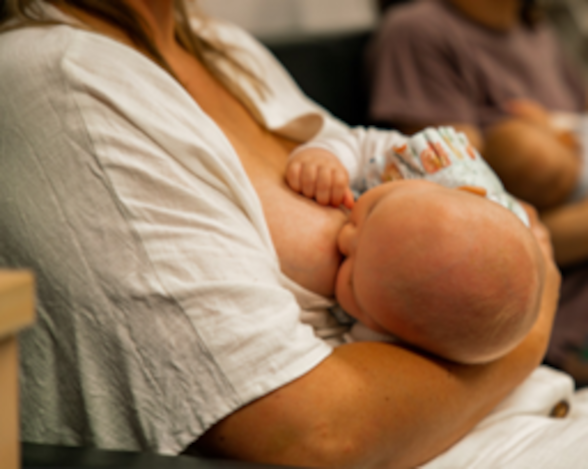
Centre for Human Lactation Research and Translation
On this page
The UWA Centre for Human Lactation Research and Translation forms a hub dedicated to advancing our understanding of breastfeeding and using that knowledge to address the challenges and support breastfeeding for both women and babies.
Our mission

Professor Donna Geddes
Centre Director
Our mission is to create knowledge that informs evidence-based education and improved care for women and their families throughout the lactation period, ultimately leading to enhanced well-being and improved health outcomes.
Our vision is to conduct interdisciplinary research into areas such as lactation biology, milk composition, breastfeeding challenges, and benefits for maternal and infant health.
Building upon our research findings we aim to develop cutting edge solutions for breastfeeding issues in collaboration with our Consumer Advisory Group, and entities such as the UWA Centre for Mothers and Babies and the ARC Industrial Transformation Training Centre for Next-Gen Technologies in Biomedical Analysis.
Our projects
-
The effect of postpartum exercise on milk, composition, milk production, and maternal body composition
This project will investigate the types and durations of exercise that women participate in in the first six months. After birth whilst breastfeeding, we will investigate and measure milk composition in response to acute exercise sessions. We will also track changes in milk composition (including maternal microbiome), milk production and maternal body composition over the lactation period.
-
Prevalence of maternal dietary restrictions during breastfeeding
It is becoming common practice to restrict maternal intake of certain foods to reduce perceived infant issues, such as colic and other conditions such as eczema. Whilst there exists little evidence for this practice, we endeavour to explore the prevalence of dietary restriction and compliance during lactation. Further, we will investigate perceptions of infant responses to the restriction.
-
Breast growth in adolescence and associations with pregnancy and lactation outcomes
This study aims to explore breast changes in adolescence and their associations with breast growth and development during pregnancy and breastfeeding outcomes. Pregnant women will be invited to participate in the study which will involves measures of breast changes (volume, ultrasound imaging) during pregnancy and the monitored during lactation.
-
Birth trauma and its impact on the initiation of lactation
Birth trauma has emerged as an experience which profoundly affects maternal well-being. This proposal aims to explore women’s experiences and how these have impacted upon their breastfeeding initiation and journey.
-
Seasonal Variation in Human Milk Donations in WA
Often mothers struggle to produce enough milk for their preterm or vulnerable, sick babies due to maternal comorbidities. In this situation, donor human milk is the most desirable option to feed these infants whilst mothers establish their own milk supply. Thermal processing of donor human milk is carried out to reduce the bacterial and viral content of the milk to ensure no transmission to the recipient infant. However, increased bacterial loads diminish the impact of pasteurisation. This study aims to explore the impact of season on the microbial profiles of donations to the milk bank.
-
How maternal knowledge of breast and formula feeding impacts infant feeding practices
Mothers can now readily access diverse sources of information on feeding their babies. Much of this information conflicts with public health recommendations. This project will explore the sources of information that mothers access to make feeding decisions in addition to determinants of breastfeeding duration.
-
Why women choose to exclusively express their milk for their baby
Milk production can be initiated, established, and maintained by breastfeeding or expression or both. This project seeks to understand the motivation for exclusive expression and the relationships with the amount of milk produced.
-
Is melatonin in human milk related to sleep wake cycles in breastfed infants
This project involves the development of analytics to measure melatonin in human milk. Human milk melatonin will be measured across a 24-hour period at 3 months postnatal and analysed in relation to feeding, expressing and both maternal and infant sleep. Further, intakes of melatonin intake will be measured and related to both feeding and sleep. at 6, 9 and 12 months. Finally, we will determine if human milk melatonin during breastfeeding is predictive between infant sleep patterns at 6, 9 and 12 months of age.
-
Nuts For Babies Study
By 1 year of age, 10% of babies in Australia will develop a food allergy. Evidence to date suggests that the ideal time to prevent food allergy may be during breastfeeding, but little is known about the effect of what mothers eat while breastfeeding on the risk of food allergies in their babies. Conducted by the Nutrition in Early Life Team at The Kids Research Institute Australia, the Nuts For Babies Study is testing whether the amount of nuts (specifically peanuts and cashews) a mother eats during breastfeeding has an influence on her baby’s food allergy development. The study is looking for pregnant women expecting one baby, who are planning to breastfeed and don’t have a peanut or cashew allergy. See the link for more information or to express interest in participating. www.thekids.org.au/nuts-for-babies
Meet the team
Professor Donna Geddes: Director
Professor Donna Geddes is human lactation scientist who has dedicated her career to advancing our understanding of human lactation and maternal-infant health. Donna has several leadership roles including, Head of the Geddes Hartmann Human Lactation Research Group, Director of the Australian Breastfeeding Research + Lactation Research and Science Translation Network, and Milk Sensor Lead and ARC Industrial Transformation Training Centre for Next-Gen Technologies in Biomedical Analysis.
Clinical Associate Professor Mary Sharp: Co-Director
Associate Professor Sharp is the Medical Co-Director of Neonatology in the Child and Adolescent Health Service. She is a clinician researcher focused on the long-term neurodevelopmental and medical outcomes after preterm birth. She chairs the Family Integrated Care committee and is committed to empowering parents’ active involvement in the care of their preterm or sick infant.
Associate Professor Debbie Palmer: Co-Director
Associate Professor Debbie Palmer’s research focuses on nutritional strategies during pregnancy, lactation, and infancy to improve maternal and child health outcomes. Following 10 years of clinical paediatric dietetic experience, Debbie embarked on research predominately focussing on strategies for the prevention of allergic diseases in children. She has now conducted eleven nutritional intervention randomised controlled trials and the evidence generated from these trials has been translated into national and international allergy prevention guidelines.
Professor Mark Nicol: Co-Director
Professor Mark Nicol is a medical microbiologist in the Division of Infection and Immunity in the School of Biomedical Sciences. He also holds an honorary appointment at the University of Cape Town, South Africa. He has a passion for using modern molecular tools to understand complex microbial communities, investigating how imbalances in these communities cause illness and to develop and test better diagnostics for infections, particularly for diseases relating to poverty.
Professor Richard Vokes: Co-Director
Richard is a Professor of Anthropology and International Development at the University of Western Australia; Research Affiliate of Oxford University, and Research Associate of the Western Australian Museum Boola Bardip. He is also Director of the Ethnography Lab of Western Australia. As an Oxford University-trained anthropologist with 24 years’ fieldwork experience in Africa, Antarctica and Australia, Richard has led complex heritage management and development projects, around the world.
Jacki McEachran: Business Support Specialist
Jacki holds a Diploma of Project Management (Australian Institute of Management, WA). With a career spanning 20 years in various industries, 12 of those years with The University of Western Australia. Her role includes overseeing financial operations, implementing efficient processes, and fostering collaborative teams to achieve corporate objectives.
- Contact the Centre via [email protected] or +61 8 6488 2988
Strategic advisory board
- Anthony Fortina
- Professor Anu Rammohan
Area co-leads

Research
Co Leads
Prof Donna Geddes, Prof Nicol, Prof Vokes & Dr Lisa Stinson.

Education
Co Leads
Dr Zoya Gridneva & Prof Donna Geddes, Assoc Prof Debbie Palmer

Translation
Co leads
Dr Sharon Perrella & Clin Ass Prof Mary Sharp
In the realm of human lactation research every discovery is a step forward, illuminating the path toward improved maternal and infant health, one drop of breast milk at a time
Professor Donna Geddes
Centre Director
Contact us
Centre for Human Lactation Research and Translation
Location: Second Floor, Bayliss Building, UWA Perth campus.
Phone: +61 8 6488 2988
Email: [email protected]
